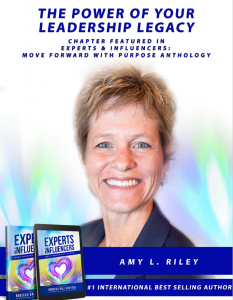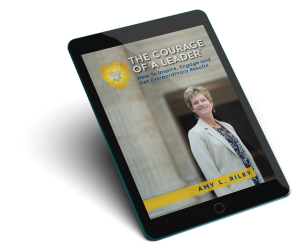My guest today on The Courage of a Leader podcast is Elizabeth Bachman.
With a lifetime spent perfecting the art of presenting, Elisabeth helps high-level clients master a message that brings the funding they need, the allies they want, the results, they desire, and the recognition they deserve.
I’m glad you’re tuning in to get Elizabeth’s practical guidance and examples that will help you elevate and strengthen your message.
About the Guest:
Elizabeth Bachman is a master in Speaking, Presentation Skills, Sales and Leadership. With a lifetime spent perfecting the art of presenting, she helps high-level clients master a message that brings the funding they need, the allies they want and the recognition they deserve.
A sought-after speaker and strategist in Silicon Valley, nationally and internationally, Elizabeth works with leaders and influencers who need to become concise and compelling presenters. She helps them present as smart, down-to-earth, loose, friendly—even funny—and still be taken seriously.
Elizabeth is the host of the international podcast: Speakers Who Get Results, where she interviews experts on presentation skills, leadership, visibility, and cross-cultural communication.
Amy was a guest on Elizabeth’s podcast. You can check out the episode here: https://podcasts.apple.com/us/podcast/the-courage-of-a-leader-stepping-up-even-when/id1491842861?i=1000593962655
About the Host:
Amy L. Riley is an internationally renowned speaker, author and consultant. She has over 2 decades of experience developing leaders at all levels. Her clients include Cisco Systems, Deloitte and Barclays.
As a trusted leadership coach and consultant, Amy has worked with hundreds of leaders one-on-one, and thousands more as part of a group, to fully step into their leadership, create amazing teams and achieve extraordinary results.
Amy’s most popular keynote speeches are:
The Courage of a Leader: The Power of a Leadership Legacy
The Courage of a Leader: Create a Competitive Advantage with Sustainable, Results-Producing Cross-System Collaboration
The Courage of a Leader: Accelerate Trust with Your Team, Customers and Community
The Courage of a Leader: How to Build a Happy and Successful Hybrid Team
Her new book is a #1 international best-seller and is entitled, The Courage of a Leader: How to Inspire, Engage and Get Extraordinary Results.
https://www.linkedin.com/in/amyshoopriley/
Link mentioned in the podcast
The Inspire Your Team assessment (the courage assessment): https://courageofaleader.com/inspireyourteam/
Thanks for listening!
Thanks so much for listening to The Courage of a Leader podcast! If you got inspired and/or got valuable leadership techniques you can use from this episode and think that others could benefit from listening, please share using the social media buttons on this page.
Do you have questions or feedback about this episode? Leave a comment in the section below!
Subscribe to the podcast
If you would like to get automatic updates of new The Courage of a Leader podcast episodes, you can subscribe to the podcast on Apple Podcasts. You can also subscribe in your favorite podcast app.
Leave us an Apple Podcasts review
Ratings and reviews from our listeners are extremely valuable to us and greatly appreciated. They help our podcast rank higher on Apple Podcasts, which helps us ignite The Courage of a Leader in more leaders! Please take a minute and leave an honest review on Apple Podcasts.
Teaser for next episode
Tune in next for “The Humane, Kind, Sustainable 5-Step Process to Getting More Done Every Day” with Dr. Alison Miller. Alison Miller is a clinical psychology PhD and entrepreneur who has built three successful businesses from the ground up. She knows how drive for results every day, and you’ll appreciate her insights and techniques about how to do so in a way that really works for you.
Transcript
My guest today on the courage of a leader podcast is Elizabeth Bachman. With a lifetime spent perfecting the art of presenting Elizabeth helps high level clients master a message that brings the funding they need, the Allies they want, the results they desire and the recognition they deserve. I am so glad you're here to tune in to get Elizabeth's practical guidance and examples that will help you elevate and strengthen your message.
Amy Riley:Welcome to the Courage of a Leader podcast. This is where you hear real life stories of top leaders achieving extraordinary results. And you get practical advice and techniques you can immediately apply for your own success. This is where you will get inspired. And take bold, courageous action. I am so glad you can join us. I'm your host, Amy Riley. Now, are you ready to step into the full power of your leadership and achieve the results you care about most? Let's ignite the courage of a leader.
Amy Riley:I am glad to be with you today, Elizabeth, to talk about being heard and how presentation skills can help you be heard and achieve the results that you want to achieve. And I really appreciate your positioning on this topic or this skill set that you're not just about. Let's show up polished. You're also about how do we get the stuff done that we want to get done? How do we get the results? So how did you come to believe in the power of presentation skills? Elizabeth?
Elizabeth Bachman:First of all, I'm so happy to be on this podcast. You've been a guest on my podcast and and oh boy, this was really fun. So I'm honored to be your guest. I I think I like to think I've been dedicated to the art of great priests great communication, since I first walked on stage at the age of five. And afterwards, my mom, I heard my mom tell her friends that I was the best bunny rabbit ever to grace the stage of the hillside school. And I was hooked just like, oh, they like it. So I thought I was going to be a famous actor on Broadway. By the time I got to college, I realized I was actually a better director than I'm an actor. I'm an oldest child. So when I told my little sisters that I was going to be changed my major to directing instead of acting, they said, Well, duh, you boss, everyone around anyway, might as well give up and get paid for it. So I got a degree in directing, and French Yes, and wound up directing operas, and spent 30 years as an international opera director around the world. Great fun, took me to pretty much every continent except Australia, and including running an opera company. And now what I do is I leverage that, to help people in business show up and be heard. And it turns out that presentation skills, in my mind is so much more than giving a speech. At a certain level. If you want to get from say, director or senior director to vice president or C-level, you've got to be doing public speaking. But even but before that, to get from say from manager to director, a lot of people get stuck at manager and they never get up to director because because of the way they show up or don't show up in within their organization. And so that's really what I focus on is helping people who are usually pretty smart. But get taken for granted, or ignored. And sometimes it's because of gender. Sometimes it's because of age. You could be older or younger than everyone else in your company. I do a lot of work in Silicon Valley. So people who are over 40 have a hard time being heard in Silicon Valley. Yes, because it's basically if you're if you're not part of the dominant culture. Exactly. It could be nationality, it could be In the other, the other things that make you other, I work mostly with high level women in tech and law, helping them show up, mostly because I have personally made all the mistakes myself. So all the successes I've had, I've also wasted years, waiting to be recognized for my good work instead of actually marketing myself that I was the product, if you will, and making sure that the right people knew what I was good at.
Amy Riley:Yeah, excellent, Elizabeth. So let's say that you are the youngest in the room, or the oldest in the room, or the only one without an engineering degree, or one of the few people of color. And your ideas are not getting heard, right, or you're getting stuck at manager high and you're not getting the visibility and the respect and credibility in the platform to get to director.
Elizabeth Bachman:The other piece of that is you're stuck at manager and you're watching the promotions, go to louder, flashy, or people who who are getting all the attention that should be getting to you. Yeah, so the first thing is, but I think of it as strategy, script and style. That's like a break it down into three sections. What's your strategy? Who needs to know what you're good at and what you want? So if you're not being heard, it's so much it's before it's whether you're not being heard? It's why are they not listening? Mm hmm. Are they not listening? Because there are other people who are louder? Or because you're female, and the the men are talking over you? Which is something that nobody really trains you to do that society socializes us. I don't think it's anybody's fault. I think it's just it's social conditioning. And if you're being talked over in a meeting, then the key thing is to find your allies. And make sure that you have an ally. who can, who can say, Wait, Amy said something really good just now. Or? Thank you for that idea. That's exactly what Amy said five minutes ago.
Amy Riley:Yeah.
Elizabeth Bachman:So if you have somebody, friend of mine calls it reinforce her voice. If you have some, yeah, have an ally to do that. And of course, you do it back up, you know, to be an ally, to recruit allies, you've got to be a good ally. Yeah. So you do that back? And make sure that, and one of your allies should be the people who are leading the meeting? Yeah, hopefully they are that most of the time, the people who are ignoring you aren't doing it on purpose. Every once in a while you've got someone who's threatened by you, and who is actively putting you down. But most of the time, it's, it's because you're not speaking a language they can hear. Mm hmm. And so if they are single focused, and thinking about their thing, they're actually not listening. Yeah. So you have to speak up in a way that has you be listened to?
Amy Riley:Yes. So now are we getting now we're getting into script. Now we're getting into script
Elizabeth Bachman:the words that you use? Exactly.
Amy Riley:Yeah. So strategy is who needs to know what's important to them? Who can I allies be? Have those conversations to create allies, active allies?
Elizabeth Bachman:ey want to spend hundreds and:Amy Riley:Now you're their single focus for that period of time, right?
Elizabeth Bachman:This is a way that people that the multi focus, people sabotage themselves all the time.
Amy Riley:Okay, I love this distinction, Elizabeth, between the single focus and the multi focus, I'm just thinking about how valuable it would be to bring awareness to that in teams, and begin to have people acknowledged for themselves, I'm in a single focus mode, or I'm being multi focused at this time, and just bringing that distinction and that language, to our interactions.
Elizabeth Bachman:And from the other side of it, for the single focus people who are listening to this, the multi focus people think they've been heard. Because multi focus, people can talk to other multi focus people, and you keep five ideas going at once. And so if a multifocal people person meets you in the hallway, and says, Oh, by the way, I'd like to talk about dadadada da. You need to make sure that you have listened and acknowledged them. Because otherwise they think that you don't like them. You know, me that's, that's another thing is this is particularly gender linked, is that when women are not heard, they tend to take it personally. Again, I don't know where that comes from. We are socialized that way. And then they think that the other person doesn't actually like them because they are relational. Yes. It's someone who's thinking in terms of relationships, instead of business. Yes. So if you are if you're the single focus person, you could say, thank you. I heard you. I can't think about that now. Could we talk at five o'clock today? Yes, four. instance. Yes, yes. And that would avoid so many misunderstandings,
Amy Riley:I think is does even categorizing it that way. Right, Elizabeth? Because I'm because I'm one of the people who would take it personally. Yeah, I'm bringing something important to the table, you know, to this stream of work that we're engaged with right now. And if that gets dismissed doesn't get heard. I'll take that personally, instead of getting it single focus. They're just focused on something else. Right now.
Elizabeth Bachman:This happened to me. This happened to a short story about this. My client, Maria, Maria, she's a wonderful Latina. She's very, very involved in, in a Silicon Valley company. She wanted a promotion, she had an idea. She wrote a proposal. And here's part two of this is she was a multifocal person. Women are taught to hint, instead of asking directly, she just dropped a hint. So what she did was she wrote up she slaved over this fabulous proposal, and sent it off to her manager, Jason watt, instead of saying, Here's my proposal for the promotion. I want. She titled it. Here's something I think you'll be interested in. Jason, saw the email came come in, didn't think it was important. And I'll get back to it. And you know how that is you get 200 emails a day, it went to page three or four in the inbox. So after a week, Maria had been fretting about it. Then she she called Jason and said, What did you think of my proposal? A week later, Jason said what proposal? And because she hadn't said directly, single focused, told this single focus person that she she had, that she wanted the promotion, and here's what she thought she could do in that position. And Jason didn't say, oh, yeah, yeah, I'll get to it. Well, Maria, thought that meant she hated him. She told all her multifocal friends about this, who also reinforced. Clearly he hates you, you've got to quit. But one of the friends knew me and said, Talk to Elizabeth first. And we sat down and we realized that it wasn't here. He just hadn't heard her. He hadn't understood. And she had not been direct enough to penetrate to get into his brain. And so she went back to him, made an appointment, talked about what she wanted. He read the proposal, he said, fabulous, absolutely. Got it all set up. She got the promotion, and she's now she's now in a position where she is heard and valued. She's very visible. She's very valued. She could have just quit. Yeah, she was ready to quit. Yeah. Or I misunderstand that she should have right. Yeah. It was it was a language issue. And that's the thing. That's where I get really passionate about this is understanding the way people speak to each other. That's the style of strategy, script and style is if your understanding if you're not speaking their language, they are not going to understand you listen to you hear you.
Amy Riley:Excellent. All right, Elizabeth. I'm gonna pause this right here, so I can tell the listeners more about you. Really got into the conversation there with strategy, scripted style, and that's an excellent illustration with Maria's story. Elizabeth Bachman is a master in speaking presentation skills, sales and leadership. With a lifetime spent perfecting the art of presenting she helps high level clients master and message that brings the funding they need, the Allies they want and the recognition they deserve. She's a sought after speaker and strategist in Silicon Valley, nationally and internationally. Elizabeth works with leaders and influencers who need to become concise and compelling presenters. She helps them present as smart down to earth, loose, friendly, even funny, yet still to be taken seriously. Elizabeth is the host of the International podcast speakers who get results. I recommend you take a listen, where she interviews experts on presentation skills, leadership, visibility and cross cultural communication. Having spent over 30 years directing such luminaries as Luciano Pavarotti and Placido Domingo in more than 50 operas around the world, Elizabeth brings has a wealth of tools to help business professionals become respected presenters. Fluent in five languages, she brings her global experience to her clients. Thank you so much for being on the courage of a leader podcast today. Elizabeth, you've already shared so much great information with us. I'm glad you're here.
Elizabeth Bachman:Thank you, Amy. It's an honor to be your guest.
Amy Riley:Yeah, thank you. Let's talk more about style. So I think this is where you're saying, we're getting into our style, how do we speak their language? How do we do that? Elizabeth, how do we decipher here's the language they're speaking, here's, here's how I can speak words. And a style, though understand,
Elizabeth Bachman:telling stories is a great way to illustrate your point. It's also a great way to raise your visibility, you shift the way you communicate, so that you can shift the way you are perceived. And there are many, many, many techniques. One of the ones that I use a lot is telling a small story like that, that illustrates a problem. Another good way of doing that is if you're one of the people who's taken for granted, yes. Track your achievements. I don't know if you do this in your company. But quite often people will say what are your weekly goals? And that's fine that if you set your weekly goals, say you do it Sunday night or Monday, then on Friday, you want to tell your manager, how, where did you get and it's just three, it's a one paragraph, these are the three things I'm mostly working on this week. And then you then you tell them, I like to do it Friday morning, because then if something's come up during the week, the manager can say, actually, that's great. But forget, forget point B, forget number two, because I need you to deal with this crisis instead. But then, but don't just do it in an email, do it in a document, eat a running track of it. And then every three or four weeks, look at what you've what you've accomplished. What are you really good at. And then make a story about it. Hmm, do a story around around what it is. So I solved a problem for Maria, for instance. And that's, that's a slightly longer version of just a one minute story of you know, that problem we had with the client last week, I sat down with them and answered their questions. And they're now so excited to be using our software. They don't know how they ever lived without it. But that's when, because you say I sat down with or I set up an in, I set up a meeting with them and, and the onboarding team. So that you say that it was your idea with your team. And then you can sprinkle it into conversation, I think of it as seeds, planting seeds. You have to do it over time, dropping little things of I care about this, because this has to do with my, with my history, or here's something here's some good news, things like that. Those stories, that's something that you can do in a in short chunks. It's not the time it takes to write a one hour speech. You can do that in short chunks. And you have to do it with someone else. This is what we do in the visible and valued leadership certification program is we have a cohort we have a series of cohorts where you work with somebody who can then reflect back to you. I don't know what you're saying. I don't I don't understand why this matters. Or wait a minute. That's something important to don't just gloss it over because it was easy for you. That's something that that most people can't do. So tell a story about that. The more you can talk about, you know, the thing I'm really good at is dadadada da, then you can't then people start noticing. Yeah, and then they go to you as the subject matter experts. That's the way I often start.
Amy Riley:Yeah, well, that's that's a powerful way and a way we can ongoingly work on that the compliment of telling stories and tracking your achievements. Yeah, right. Here's what I'm focused on. Here's what I'm accomplishing. And then By working out what what are the stories? What's the concise story? I would tell about that? Yes. And having those words. I'm passionate about this, right? I'm seeing I provide value in these ways. I'm also thinking when we tell the story, Elizabeth, it's not just what we've accomplished. I mean, it's the so what it brings it to life it brings, why do we care? Emotion, some some impact. This customer said, I can't I can't imagine how we ever lived without the solution. Uh huh.
Elizabeth Bachman:Yes. That's the other thing that's so important is what's the benefit? Again, to your listeners, who are the people who care. For instance, my client, Janet was stuck at Senior Director for 13 years. She was senior director over and over, she's super smart. She's a tech person. And she was always solving problems for the company, never got acknowledged, never got a raise, never got a promotion. So by the time she called me up, she she said, I have another problem. They want me to solve, I know how to solve it. But this time, I want the recognition for it. And so what we did was positioned it as her strategic plan. And then she went to every every person at C-level, there were seven of them, she went to the seven top C level people, each one, she said, This is my strategic thinking about how to solve this problem. And I'd like your advice about this. So for each one, it was the thing that that other person cared about. Sometimes it was, I'm going to have to work with this other department, you know them so much better than I do. Can you help me? How do you suggest I approach it, but basically, she enrolled them as her allies in the project. And they were so excited that the next time they had, they had an executive meeting, they created a new vice presidential position for her. So she did the project she was going to do already, she already knew how to solve the problem. She solved the problem, but she got the raise the promotion and the recognition. Just by the way, she talked about it.
Amy Riley:Lovely. My strategic thinking. Terrific. So if I am a people, leader, Elizabeth, I take away from this conversation already, you've given us so much, so much great information, that if you're a leader, you want to raise your visibility, right, start telling stories, start tracking your accomplishments, and what your what you're working on, start to think about things in terms of am I in in a single focus or a multi focus? place right now begin to come become aware of how that is playing out on your team? Mm hmm. Right? Have you been sharing that distinction with your team? And how do you make sure that if someone's in single focus mode, and we want to bring something else to the conversation, what's the best way to do that? Make an appointment schedule another time, right. So that it can become that single focus, anything else that you would offer to people, leaders in making sure they're heard and making sure that people on their team are heard? Because there's too many great ideas that get glossed over in our world?
Elizabeth Bachman:Right? Well, as a leader, make sure that everybody on your team is heard. Yeah. And one of the things that has worked very well when I'm working with teams is to talk about what are your communication styles? And what are your thinking styles. Some people can make decisions, just boom, they know they they make fast decisions. Other people have to think about it for a couple of days. So the people who make fast decisions they need the people who are thinking about it, because this those who are thinking about it are going to come up with objections that the fast decisions don't really don't mean might miss. And the people who take time and who are gonna give you way more information than you need. They need to know how to be concise. Get to the point, those are often the multi focus thinkers and you just need to know how to value them. So that you know that the people who are the idea people and the exciting people and the ones who Have a million ideas that said a second really need the list checkers to keep them going. I know for me, for instance, I surround myself with people who are better at that kind of thing than I am. I, I do I usually wind up implementing the fourth, third or fourth version of something? The first idea, you know, I may have three or four ideas, I have empowered my team, I've asked my team to check me, what do you really think? Do you really mean this? And so we go back three and four times. Because I know that for me, usually, the fourth idea is better than the first idea. I am married to somebody whose first idea is usually best, but who needs to have other people implemented for her. So she though my wife make snap decisions, and I've had to learn to speed myself up. And she has to learn to slow herself down in order for us to function together.
Amy Riley:Yes, that seems like another important distinction for teams to be overt about and talk about, who are our processors who need some more time to pull their ideas together to be able to share them in a concise way? Yeah, how can we how can we talk about who's in which camp? And how do we make conversations work for both of them, I feel like, we miss too many of the great ideas from people who need a little bit of time to process but are going to bring together some pieces of the puzzle in a way that others are not seeing.
Elizabeth Bachman:I highly recommend doing personality type analysis. Yeah, you can do you know, it could be Myers Briggs, the Enneagram, the 16 personalities, yeah, disc, there, there are lots of them out there. Bring somebody in from outside to manage it. Because you really need the outside eye. So you really want to hire a trainer to take you through it. But once you know it, and you've talked about it, it makes life so much better. There's there's a team I've been working with for the last couple of years. And I've been working closely with someone else who really specializes in the personality types. And it has now become the team in that company that everybody wants to be on. Because that's the team that really functions really talks to each other. Yes. And nobody wants to work in that other division. They always want to work on the division that we're doing it because we take the time to talk about how does Jose need to get Mateus is attention? Yes. And where does Susan fit in? And how do we do that? It just you have to dedicate the time, but but the results are really worth it.
Amy Riley:Yes. And it's giving objective language to communication style preference differences. Right. I think this is a theme, Elizabeth, I think that's been running through the conversation today. How can we make our style and our approach? Overt? And how can we talk about that with others? Are we in single focus mode or multi focus mode? Are we processing fast or slow? On this one? What's our style? What's our approach? Right? And when we can talk overtly about our process? And not just about the content? Yes, it can really improve the interaction and the ideation
Elizabeth Bachman:you know, it is the natural human tendency to assume that everybody else thinks the way you do. You know, I find that I you know, I've been working internationally for 40 years now and the way trying to put my my brain into the put myself in the shoes of my German clients, or my Austrian clients or when I'm working with Japanese and it I do a lot around language and how do you how do you speak English, if it is your third or fourth language and the third or fourth language for your, for your listeners? It's putting yourself in the shoes of your listeners. And the temptation is to think that everybody's going to understand what I say because I understand it. So you have to actively remember that they might not
Amy Riley:yes, and when we're putting together a presentation messaging ideas for me saying, what my my strategic thinking whatever it is going first to the audience? Yep. Who are they? What do they care about? What do they want to hear about? And how can I adjust my script? That's the strategy part, right? And then how do I adjust my script and my style so that I can be heard. And
Elizabeth Bachman:just to add one other one other piece is, we're in an, in a very international world now. So there are many, many teams with people, you know, people are calling in from five different time zones. Be aware when you speak, that you need to actually speak clearly, and use words that they will understand. If you're doing a presentation to a multilingual audience. Make sure that you slow down, stop at a period, stop at a paragraph. give people time to listen. So I'm I'm slowing down and enunciate in here that I learned from the opera singers is working with opera singers, diction, you know, opera singers are constantly singing in a language that is not the language that they they grew up with. And they're singing, which is even harder. Yeah. So you have to function on you have to pay attention to where are the pauses? Where are the periods? Where did the new ideas come in? I think of it often as people pauses and paragraphs,
Amy Riley:nice. Strategy, script style, people pauses, paragraph, rice. Really, really great information, Elizabeth, so many practical techniques that you've given us that we can all begin to implement right away. Thank you for being on the podcast today. Elizabeth. It's been a pleasure.
Elizabeth Bachman:My pleasure. It's been an honor.


 A Summary of The Courage of a Leader® 4 Pillars
A Summary of The Courage of a Leader® 4 Pillars




